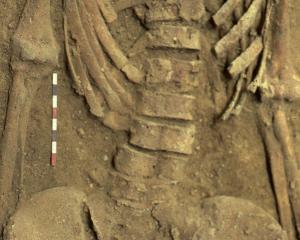Roger Shepherd formed Flying Nun Records in Christchurch 35 years ago, changing New Zealand's popular music landscape irrevocably. He looks back on his life with the label in the new memoir In Love with These Times, and talks to Gavin Bertram.
In late 2006 I sat with Roger Shepherd in an Auckland boardroom, as he combed through a large part of his personal history.
But that afternoon at the Warner Music offices he wasn't pouring over photographs or family trees.
Rather, the Flying Nun Records founder was wading through the legendary New Zealand independent label's back catalogue, gradually compiling a selection that would comprise its 25th anniversary box-set.
Not long returned from a decade-long stint living in London, Shepherd had applied himself to the job.
He was meticulously going through the vast and varied discography of music that he had helped bring into the world through the 1980s and 1990s.
He'd even bought a portable turntable to listen to the collection of vinyl that had been in storage for years.
It was clearly an emotional nostalgia trip, as Shepherd revisited these tracks that he'd once laboured so hard to release.
Now, as Flying Nun prepares to turn 35, he has again reflected on the label's history, this time pouring his memories and experiences on to the page.
His efforts were this week published in the form of the memoir In Love with These Times: My life with Flying Nun Records.
Shepherd says writing the book was a similar experience to compiling the Flying Nun 25th Anniversary Box-set.
"I'd come back from the UK, and it was very much like reacquainting myself and reconnecting with the music,'' he says.
"Writing the book, it was just starting to reconnect with the people, some of whom I haven't thought about or seen for years.''
He began thinking about writing the memoir several years ago, before HarperCollins publisher Finlay McDonald expressed interest.
Shepherd found writing the 85,000 words challenging, which is why the book became a memoir rather than a true history of Flying Nun.
While it's an honest account of the label's activities, he didn't feel the need to "grind an axe''.
Dunedin writer Roy Colbert, a longtime friend of Shepherd, found In Love with These Times to be "quite a gentle book''.
"I don't think Roger wants to offend anyone with this book, he's very complimentary to pretty much everyone,'' he says.
"He's probably thinking about the legacy of Flying Nun and himself.''
In Love with These Times charts Shepherd's life from growing up in the Christchurch suburb of Aranui in the 1960s and 1970s, through the Flying Nun years, to the current day.
He describes himself as something of an underachiever at secondary school, who enjoyed a great after-school job at the central Christchurch Record Factory.
There, he was perfectly poised to meet like-minded music fans, especially as punk took hold. His interest in live music saw Shepherd visit Dunedin in 1978, where he witnessed this city's seminal punk act, the Enemy, at the then Beneficiaries Hall on Filleul St.
"Clearly the Enemy were the real deal,'' he said in 2010, remembering that occasion.
"And that was the start of the connection really, coming to Dunedin and seeing the Clean play the same night at the Beneficiaries Hall. It would have been their first show.''
• The Clean, formed by Dunedin brothers David and Hamish Kilgour, and the late Peter Gutteridge, were to become a pivotal act in the early Flying Nun roster, and key to the Dunedin Sound movement.
The first release on the label was the Ambivalence seven-inch single from Christchurch band the Pin Group, which appeared in mid-1981.
Shepherd recounts Flying Nun's genesis in the book: "I must have been drunk. I had told someone I was going to start a record label. All around the world people had grouped together to form bands and often these bands and their fans coalesced into scenes. And around these scenes certain individuals were inspired to start their own record labels That was me. I wanted to be more than just an observer.''
Like the Pin Group, the Clean made their first recordings at Christchurch's Nightshift Studio in 1981.
Recorded for just $50, it became Flying Nun's second release, the Tally Ho single, which reached number 19 on New Zealand's single charts.
It was soon followed up with the brilliant Boodle Boodle Boodle EP in November 1981.
It stayed in the top-40 for half a year, peaking at No 3, and selling more than 10,000 copies just in New Zealand.
Boodle Boodle Boodle was hugely important to Flying Nun's early success.
"The Clean were the key band,'' Shepherd recounts.
"On a grass-roots level people responded to them in a way that hadn't previously happened. They achieved that without radio play. Once we experienced that with Boodle, it was like 'wow, there are all these other great bands that should be able to achieve the same'.''
In the wake of the Clean came a raft of young Dunedin bands: the Chills, the Verlaines, Sneaky Feelings, the Stones, and Look Blue Go Purple among them.
The first four of that list took a side each on the hugely important Dunedin Double EP released by Flying Nun in 1982.
Recorded by the Enemy and Toy Love frontman Chris Knox, and Doug Hood, on a four-track, the record largely defined the unique pop aesthetic that came to be known as the Dunedin Sound.
As the label's output increased through the early years, Shepherd and others in the Flying Nun office in Christchurch struggled with the expanding logistics.
In Love with These Times documents the ongoing financial fight to keep it afloat, and many of the disasters that beset the fledgling label.
"It was a total kind of roller-coaster experience, trying to find out how to do it all just by doing it,'' Shepherd says.
"And often doing it wrong first, if not once then two or three times. The only way was to just do it and hope you weren't going to die in the process, and that there was enough cash sloshing around so we could make more records. It was exciting and incredibly exhausting and quite stressful, but with the magnificent music it was all worthwhile.''
And magnificent the music was.
As well as the Dunedin acts, Flying Nun released much of the best music from around New Zealand over the subsequent decades.
From Auckland came the Bird Nest Roys, and Children's Hour, who morphed into the Headless Chickens and had Flying Nun's only No 1 single with George in 1994.
Wellington offered the Palmerston North-formed Skeptics, a truly unique entity and a Shepherd favourite.
Christchurch had a music scene to rival Dunedin's, from which the Bats, Bailter Space, and the skewed pop of JPS Experience emerged.
But Dunedin still contributed more than its fair share, with bands such as Snapper, Straitjacket Fits and the 3Ds joining continued output from the Chills, the Clean, the Verlaines, and others.
Some achieved international success and were signed to major labels or prominent independent imprints, others became cult figures around the world.
Certainly Flying Nun Records became a revered label internationally.
English journalist Martin Aston described them in The Guardian as being "surely the label with the highest quality output per capita in pop history''.
Colbert agrees with that assessment.
He was a key part of Dunedin music as Flying Nun emerged, his Records Records shop being a locus for many of the young bands.
He was often host to Shepherd when the label boss visited Dunedin and he wrote about the nascent label for the New Zealand edition of Rolling Stone magazine.
"When I interviewed him, Roger talked about the idea of people buying a record on Flying Nun just because it was on Flying Nun,'' Colbert says.
"I think that became quite valid. If it was a Flying Nun record, then people overseas just bought. That's how high the hit rate was, it was incredibly high.''
Shepherd and Colbert had already met at a party in Christchurch before the interview in Dunedin.
Colbert remembers that they had separate agendas for the second meeting.
While he was focused on the Rolling Stone article he was writing, Shepherd was there to enlist Colbert as Flying Nun's Dunedin distributor.
• An idiosyncrasy of the label's early years were that its records were personally delivered by keen individuals in each centre, including the car-less and jandals wearing Chris Knox doing the rounds of Auckland record stores.
The image is a good metaphor for the homespun and perhaps naive early Flying Nun business practice.
"It was an easy job for me in Dunedin,'' Colbert says.
"It was really just the EMI shop, they bought a lot and it was a chart shop so that helped them get in the charts. But you'd go to the DIC, which had quite a reasonable record department. All their singles were in little slots, and I was bringing in 12-inch EPs and so they wouldn't buy any because they didn't have a slot that size.''
Shepherd's constant struggle to keep Flying Nun going meant he often worried about its survival.
He's adamant that his lack of any "business common sense'' is the only thing that kept him fighting.
Later in the 1980s he moved the label's head office to Auckland, and eventually did a deal with the Australian Mushroom Records label that injected some much needed capital into Flying Nun.
It also took some of the control of the label away from Shepherd, and in 1994 he moved to London to oversee the UK operations.
Ultimately, in July 1998 that saw him forced out of the endeavour he'd launched a decade and a half earlier.
But after his return to New Zealand and involvement in 2006's 25th anniversary of the label, rumours emerged of Shepherd attempting to buy Flying Nun back.
Through various mergers, it now belonged to Warner, which was largely ignoring its colourful back catalogue.
In late 2009, Shepherd and several other investors including New Zealand music royalty Neil Finn, wrested Flying Nun from Warner.
Since then, Shepherd has stepped back into a director's role.
The label is now run alongside Auckland independent Arch Hill, releasing new music alongside judiciously chosen reissues.
He still enjoys being involved, while understanding that the challenges of selling music now may be even greater than when he founded Flying Nun.
Three and a-half decades on, Shepherd looks back on the music he helped release with understandable pride.‘‘There was a lot of really great music, I feel,'' he says.
"And the concentration coming out of Dunedin especially, it's quite remarkable that so many good records were produced. That scene was really quite small, and maybe it wouldn't have worked if Flying Nun had been a Dunedin-based label. Was that connection with the outside actually an important part of the process? I often think about the dynamics of it all.''
* In Love with These Times by Roger Shepherd is published by Harper Collins.
Anything could happen ...
"He was delightful, extraordinarily entertaining, totally off the wall, able to spontaneously combust in an intellectual fashion at the drop of a hat, and had great musical taste.'' - Chris Knox: the Enemy, Toy Love, Tall Dwarfs
"Roger was sort of like a fan, really excited when he first saw us, and he just wanted to get the music out. And he discovered other bands in the process.'' - Bob Scott: the Clean, the Bats
"Eventually Roger came to Auckland and tracked us down and said ‘I'll pay for you to record'. He was the first person to say go and do it, and we quite liked him.'' - David Kilgour: the Clean, the Great Unwashed
"He drove us home, which was a terrifying ride in his Jag, including a bout of road rage and a chase through the suburbs of Christchurch with some guy that damn near sideswiped him. But the idea that this guy was keen to make a record was kind of like fairytale stuff.'' - Graeme Downes: the Verlaines
"He had a white Jaguar and drank a lot of whisky and was pretty friendly. He clearly had some taste in music and knew a lot about it. So we were probably fairly impressed.'' - Matthew Bannister: Sneaky Feelings
"Roger borrowed off us in terms of what we knew about the music, and we borrowed off him, because we had no idea how you physically got a record in the stores. It was like a friendship that extended into a business.'' - Doug Hood: Toy Love sound man, recording engineer, promoter












